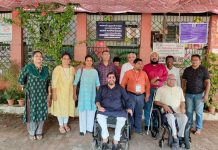Directorate of Health Services has issued a Public Health Advisory for summer season. They have asked the general public to
- i) Stay hydrated by drinking sufficient water whenever possible, even if you are not thirsty. Thirst is not a good indicator of dehydration, carrying drinking water when traveling, using Oral Rehydration Solution (ORS), and consume homemade drinks like lemon water, butter milk/lassi, fruit juices with some added salt and eating seasonal fruits and vegetables with high water content like water melon, musk melon, orange, grapes, pineapple, cucumber, lettuce or other locally available fruits and vegetables.
- ii)Stay covered by wearing thin loose, cotton garments preferably light coloured, covering your head using umbrella, hat, cap, towel and other traditional head gears during exposure to direct sunlight and wearing shoes or chappals while going out in sun.
iii) Stay alert by listening to Radio, watching TV; reading Newspaper for local weather news. Get the latest update of weather on India Meteorological Department (IMD) website at https://mausam.imd.gov.in/
- iv) Staying indoors/in shade as much as possible by being in well ventilated and cool places, blocking direct sunlight and heat waves, keeping windows and curtains closed during the day, especially on the sunny side of your house. Opening them up at night to let cooler air in, if going outdoor, limit your outdoor activity to cooler times of the day i.e., morning and evening and rescheduling or plan outdoor activities during cooler parts of the day.
Although anyone at any time can suffer from the heat stress and heat-related illness, some people are at greater risk than others and should be given additional attention. These include infants and young children, people working outdoors, pregnant women, people who have a mental illness and physically ill, especially with heart disease or high blood pressure. Travelers from colder climate to a hot climate should allow one week’s time for their bodies to acclimatized to heat, avoid overexertion, and should drink plenty of water. Acclimatization is achieved by gradual increase (over 10-15days) in exposure/physical activity in hot environment.
Elderly or sick people living alone should be supervised and their health monitored on a daily basis, keep your home cool, use curtains, shutters or sunshade and open windows at night, try to remain on lower floors during the day, use fan, spray bottles, damp cloths, ice towels to cool down body and immersing feet in 20°C water above ankle provides rapid cooling by reducing dehydration and thermal discomfort.
The Advisory further says to avoid getting out in the sun, especially between 12:00 noon and 03:00 pm, avoid strenuous activities when outside in the afternoon, do not go out barefoot, avoid cooking during peak summer hours. Open doors and windows to ventilate cooking area adequately, avoid alcohol, tea, coffee and carbonated soft drinks or drinks with large amount of sugar- as these actually, lead to loss of more body fluid or may cause stomach cramps, avoid high-protein food and do not eat stale food and do not leave children or pets in parked vehicle. Temperature inside a vehicle could get dangerous.
Employers and workers are asked to take following steps. Provide cool drinking water at work place and remind them to drink a cup of water every 20minutes or more frequently to stay hydrated, caution workers to avoid direct sunlight, provide shaded work area for workers. Temporary shelter can be created at work site. Schedule strenuous and outdoor jobs to cooler times of the day i.e., morning and evening hours, increase the frequency and length of rest breaks for outdoor activities- at least every 5 minutes after 1 hour of labour work, listen to Radio; watch TV; read Newspaper for local weather news and act accordingly. Get the latest update of weather on India Meteorological Department (IMD) website at https://mausam.imd.gov.in/, assign additional workers or slow down the pace of work, make sure everyone is properly acclimatized: it takes weeks to acclimatize to a hotter climate. Do not work for more than three hours in one day for the first five days of work. Gradually increase the amount and time of work, train workers to recognize factors which may increase the risk of developing a heat related illness and the signs and symptoms of heat stress and start a “buddy system” since people are not likely to notice their own symptoms, trained First Aid providers should be available and an emergency response plan should be in place in the event of a heat-related illness, pregnant workers and workers with a medical condition or those taking certain medications should discuss with their physicians about working in the heat, if working outdoors wear light-coloured clothing preferably long sleeve shirt and pants, and cover the head to prevent exposure to direct sunlight, organize awareness campaigns for employees, install temperature and forecast display at the workplace, distribute informational pamphlets and organize training for employers and workers regarding health impacts of extreme heat and recommendations to protect themselves during high temperatures.
The following precautions during mass gathering/Sport event have been asked to be taken. Oudoor/indoor crowded situations increase risk of acute heat-related illnesses (HRI) even in absence of active heatwave alerts in the area, physical exertion, direct sun exposure, overcrowding, and difficult access to water, food and shade may worsen health in vulnerable groups and attendees should stay hydrated, cool, be aware of HRI signs, symptoms and seek medical care.
Exposure to high outdoor and/ indoor temperatures can induce heat stress, directly and indirectly, leading to heat-related illnesses. Heat-related illnesses include (from mild to severe) ̶heat rash (prickly heat), heat oedema (swelling of hands, feet and ankles), heat cramps (muscle cramps), heat tetany, heat syncope (fainting), heat exhaustion, and heat stroke.
Heat stress may also exacerbate chronic diseases like cardiovascular, respiratory, kidney diseases. Watch out for symptoms of heat stress, which include dizziness or fainting, nausea or vomiting, headache, extreme thirst, decreased urination with unusually dark yellow urine and rapid breathing and heartbeat.
If you experience painful muscular spasms (particularly in the legs, arms or abdomen, in many cases after sustained exercise during very hot weather), rest immediately in a cool place, and drink oral rehydration solutions containing electrolytes. Medical attention is needed if heat cramps last more than one hour.
Following are the danger signs needing immediate medical attention. In adults altered mental sensorium with disorientation, confusion and agitation, irritability, ataxia, seizure or coma, hot, red and dry skin, core body temperature less than or equal to 40°C or 104°F, throbbing headache, anxiety, Dizziness, fainting and light headedness, muscle weakness or cramps, nausea and vomiting and rapid heartbeat/rapid, shallow breathing. Some of the danger signs needing immediate medical attention in children are refusal to feed, excessive irritability, decreased urine output, dry oral mucosa & absence of tear/sunken eyes, loethargy/altered sensorium, seizures and bleeding from any site.
Call 108/102 immediately if you find someone with high body temperature and is either unconscious, confused, or has stopped sweating.





